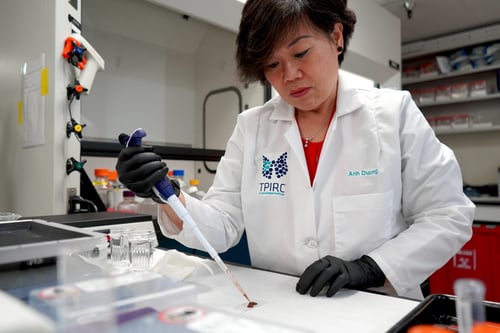A Message From Food Allergy Institute Founder Dr. Inderpal Randhawa
Approximately 33 million Americans, including 5.6 million children under 18, suffer from food allergies, amounting to about one in 13 children or two per classroom*. The prevalence of food allergies has continued to rise over the last 20 years, cementing food anaphylaxis as a global health crisis.
Just as early intervention in cholesterol and diabetes can prevent disease progression, proactive food allergy management can significantly improve long-term outcomes. However, the standard healthcare approach for food allergies—prescribing epinephrine auto-injectors and emphasizing avoidance—can be emotionally exhausting, anxiety-inducing, socially isolating, and unsustainable, especially for families dealing with multiple severe allergies.
We encourage physicians to collaborate with us to provide comprehensive care for food allergy patients, from advanced testing to personalized allergy management, helping to move beyond the limitations of avoidance strategies and towards more sustainable, long-term solutions that improve patient outcomes.
*Source: FARE
Pantaleon is the proprietary AI platform behind the Food Allergy Institute’s Tolerance Induction Program, designed to guide patients with severe food allergies to remission through a fully individualized approach. It integrates detailed patient history, a proprietary skin test, and advanced bloodwork that analyzes lymphocyte function and B cell markers specific to food proteins.
This data is processed through Pantaleon’s machine learning algorithms to generate a “Patient Snapshot,” which visually maps each allergen, its severity, and the precise consumption threshold that would trigger a reaction. Based on this insight, a personalized treatment plan is created using safe, structurally similar proteins to gradually build tolerance. Pantaleon offers an unprecedented level of safety, accuracy, and customization in food allergy treatment.
Established in 2014 by Dr. Inderpal Randhawa, the Translational Pulmonary and Immunology Research Center (TPIRC) is a non-profit research institution dedicated to finding treatment solutions for medical conditions that traditional healthcare has cast aside, including cystic fibrosis, bronchiectasis, and food anaphylaxis.
TPIRC created Food Allergy Institute's Tolerance Induction Program (TIP) using comprehensive diagnostic tools and patient-driven research to produce individualized treatment protocols. TIP allows children and young adults to achieve food allergy remission for a full spectrum of severe food allergies.

Read Our Latest Published Research:
Mass medicine vs. personalized medicine: from mathematical methods to regulatory implications
Food Allergy Treatment Unlike Any Other
Food Allergy Institute is the largest food allergy treatment center of its kind. Every patient treated through the Tolerance Induction Program® (TIP) is supported by a whole ecosystem including a dedicated clinical team, one-of-a-kind Food Lab, a precision diagnostic testing laboratory, and our specialty physician network. No other treatment center offers patients the comprehensive care that we do.
Learn more about the teams that will support your patients' food allergy treatment below.
Data & AI Applications
Precise Patient-tailored Treatment
Similar to how mapping apps like Waze and Google Maps leverage large pools of data to identify patterns and provide the most efficient route in real-time, TIP uses patient data and AI to accurately predict the optimal treatment trajectory for a patient’s unique needs down to the milligram of food proteins administered.
Through our Machine Learning models, every patient treated continuously improves our understanding of food allergies to create even more efficient treatment plans for future patients.
Watch our Founder explain AI and Machine Learning usage in the Tolerance Induction Program
Journal Of allergy & Clinical Immunology
NEW: Long-Term Efficacy and Safety of Cow’s Milk Anaphylaxis Specific Immunotherapy: Allergen Unresponsiveness via the Tolerance Induction Program®
PLOS One Journal
Journal Of Allergy & Therapy
Tolerance Induction Program Effect Explains Variation in Wheal Size, sIgE, and IgG4 in Peanut Allergic Children
European Journal of Allergy & Clinical Immunology
Allergen immunotherapy for IgE-mediated food allergy: a systematic review and meta-analysis
Journal Of Allergy & Clinical Immunology
Improvement in Health-Related Quality of Life in Food-Allergic Patients: A Meta-Analysis
Food and Agricultural Immunology
Demographic, clinical, and diagnostic correlation of almond allergy in a cohort of nut allergy patients
Elife Sciences
Experimental evaluation of the importance of colonization history in early-life gut microbiota assembly
Allergy & Asthma Proceedings
Correlation of negative skin-prick test results for tree nuts and successful tree nut challenges among children with peanut allergy
American Thoracic Society
Allergy Evaluation During Hospitalized Asthma Improves Disease Management Outcomes
Food & Chemistry Toxicology
Evaluating the potential allergenicity of dietary proteins using model strong to non-allergenic proteins in germ-free mice
Meet Our Team

Dr. Tracy Clark
Vice President of Clinical Services
Dr. Tracy Clark oversees all clinical operations and staff at Food Allergy Institute's two Southern California locations. Since 2018, Dr. Clark has focused her career on helping food-allergic children at the Food Allergy Institute. She plays a pivotal role in upholding our exemplary quality of care and in-clinic patient experience.

Herman Sandhu
Senior Manager of Software Development
Herman Sandhu is a founding member of the Food Allergy Institute and one of the minds behind the incredible machine learning software that drives the Tolerance Induction Program® (TIP). Together with his team of data scientists, Herman helps process and create treatment plans for all of our TIP patients.

Dr. Nathan Marsteller
Director of Research
Overseeing one of the largest collections of food allergy bio-specimens, Dr. Marsteller's research is the foundation of our Tolerance Induction Program® (TIP). Through his exploration, Dr. Marsteller and his team have made strides in advancing treatment for food anaphylaxis and other rare diseases.

